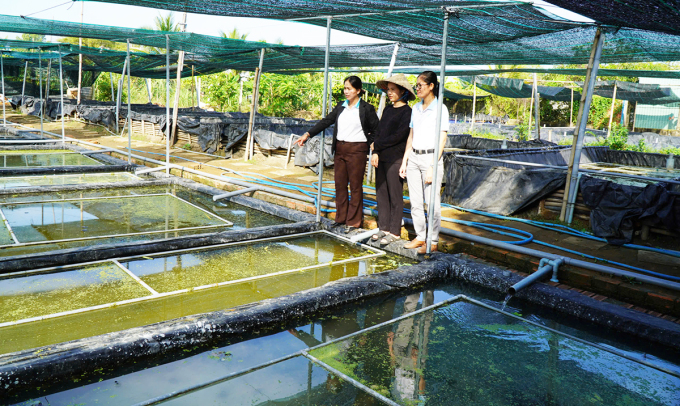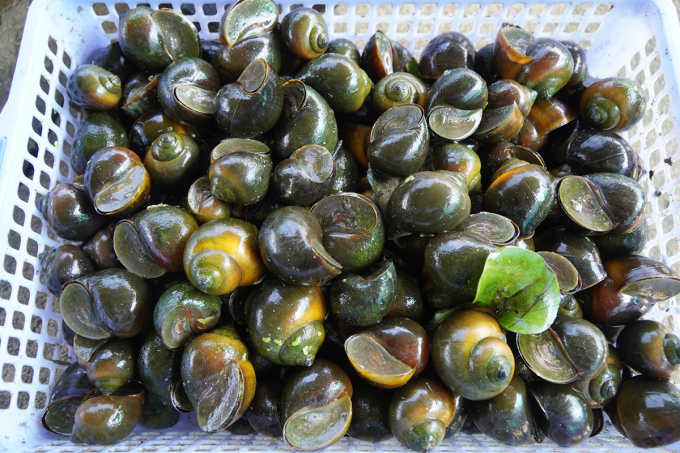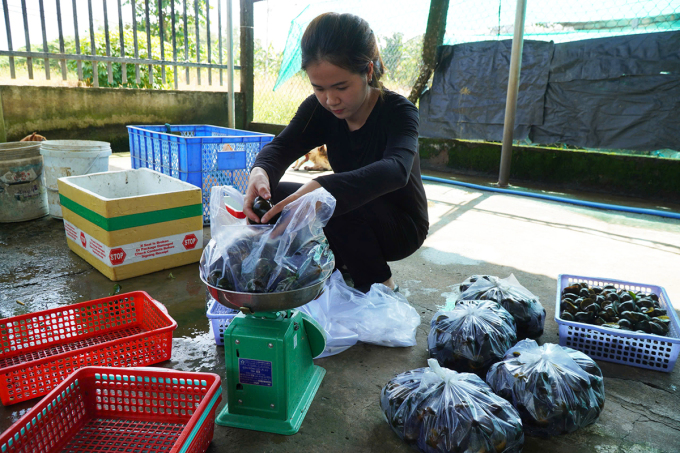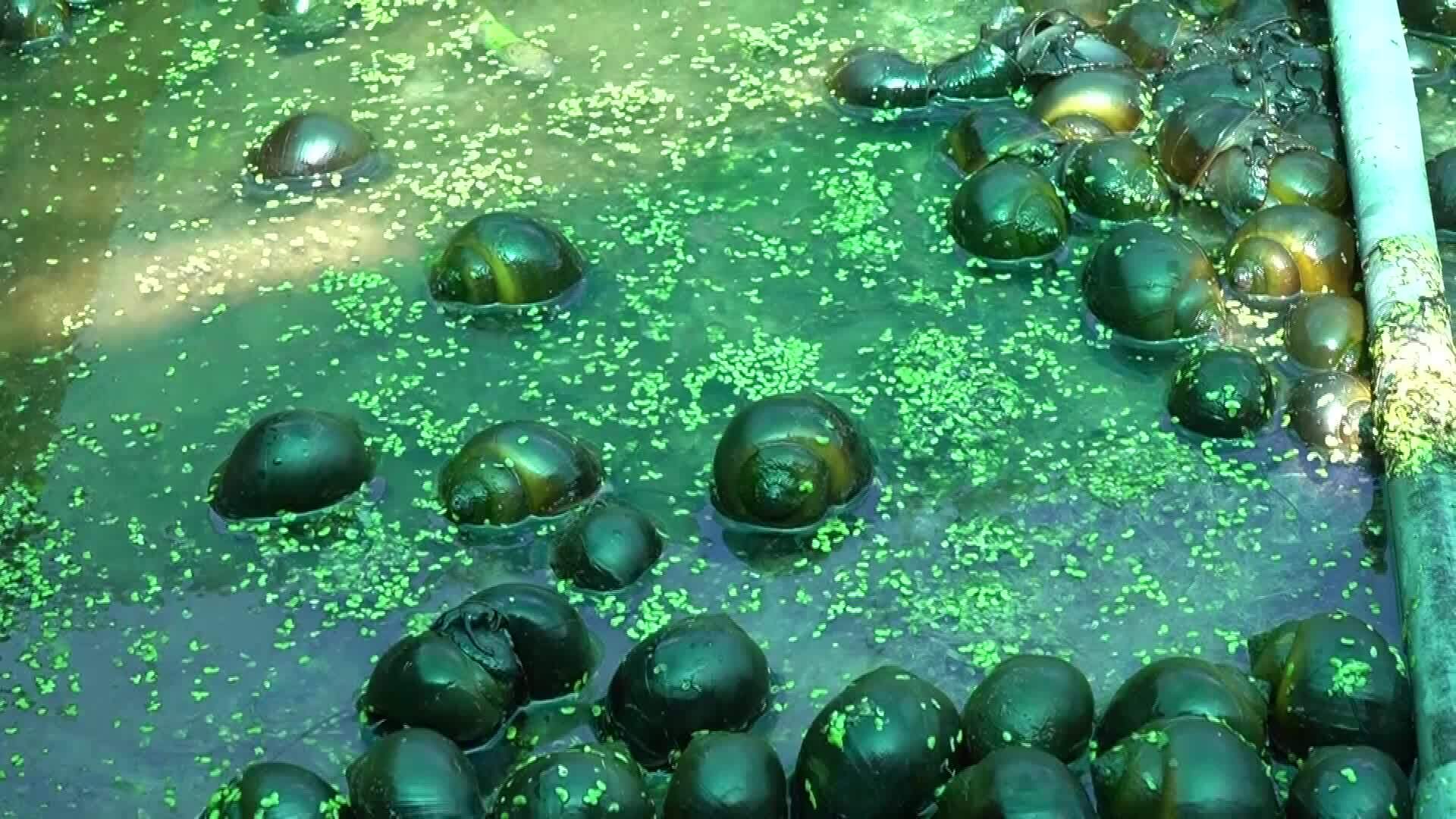Long AnTaking advantage of abandoned garden land, Ms. Nguyen Thi Thanh Hien, 27 years old, lined a canvas to raise black apple snails, earning a profit of more than 20 million VND each month.
Ms. Hien’s black snail farming farm is currently the largest in My Loc commune (Can Giuoc) with an area of more than 1,000 m2, nearly 50 tanks. The entire farm is covered with tarpaulin on the bottom and sides of the pond, above there is a mesh system, and the tanks are pumped with treated well water.
Ms. Hien said that before, working as a laborer in Ho Chi Minh City, life was very difficult. After getting married, she watched the news on the newspaper and radio and saw that there was a model of raising black apple snails in the West, so she discussed with her husband the idea of starting a business.

Guests come to visit Ms. Hien’s snail farm. Image: Nam An
Initially, she and her husband ordered half a kilo of snail eggs for 800,000 VND, plus about 500,000 VND in plastic tarpaulin, using bamboo trees available around the garden to make a test tank with an area of about 6 m2. However, due to polluted water sources, many snails die. In addition, every time the weather changes, such as intense sunlight or unseasonal rain, the number of snails decreases.
The farm owner then invested in a water treatment system and covered the net above to fix the problem. In addition, snails are also a favorite food of mice, so farmers also need to pay attention and take appropriate prevention measures.
“Clean water conditions account for about 80% of the success of the model,” Ms. Hien said, adding that after the snails have laid eggs, they have harvested the eggs and are proactive in the source of seed, so they have gradually expanded the scale.
To have more food sources for snails, she and her husband also took advantage of 2,000 m2 of abandoned ponds and gardens to raise water hyacinth, grow gourds, squash, and anchovies, which are clean foods without chemical fertilizers.

After about 4 months, black apple snails can be sold. Image: Nam An
According to Ms. Hien, the weather in the West is quite favorable for raising black apple snails. After 4-5 months, snails measuring 20-25 per kilogram will be sold for 50,000-70,000 per kilogram. On average, each month the farm sells about 2500-300 kg of meat snails. Snails breed mainly in the rainy season, less in the dry season, so depending on the time, snail eggs will cost from 300,000-500,000 VND per kilogram.
In addition, the farm also sells baby snails for breeding. After being harvested, the snail eggs will be kept in a cool place, sprayed with water every day and after about half a month the baby snails will hatch. Baby snails will continue to be raised for about half a month to more than 20 days, when the snails are as big as green beans and can be sold for 100 VND each. On average, each month the farm sells about 50,000 snail seeds and dozens of kilograms of snail eggs.
“The farm’s main distribution channel is through social networks, consumption in the Western and Central provinces. My husband and I are researching the model of raising kitchen snails to increase revenue,” Ms. Hien said.

Ms. Hien weighs snails and sells them to customers. Image: Nam An
In addition to the characteristic black color compared to yellow, which is easy to distinguish with the naked eye, black apple snails have high nutritional value due to their meat being tougher, thicker, tastier and more fragrant than yellow apple snails. Black snails can be prepared in many dishes such as: grilled with pepper, steamed snails, boiled with lemongrass, stir-fried with bananas, and snail noodles.
Ms. Vo Ngoc Huyen, Chairwoman of the Women’s Union of My Loc commune, said that Ms. Hien’s clean snail farming model is quite new in the area, initially bringing stable economic efficiency to her family.
“This association has expanded to include 5 members in the area and is a model for people from near and far to visit and learn from experience,” Ms. Huyen said.
Ms. Nguyen Thi Thanh Hien’s snail farm. Video: Nam An
Nam An




